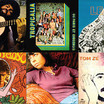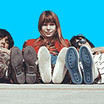Eubioticamente atraídos

a tropicalista epiphany
Brazilian views
A TROPICALISTA EPIPHANY
Hermano Vianna
Folha de S.Paulo, 19 September 1999
The other day I got an unexpected e-mail from a long-out-of-touch American friend. His message was a strange confession that started like this: “I am an ambivalent and lazy pupil. Example: I’d forgotten about this until today, when, leafing through the New York Times, I came across an article on Tropicália. Bands that you introduced me to years ago. I’m a fool for pastiche culture”.
Coming from where it came, a person positively allergic to anything with the slightest hint of “Brazilian” or “Latino” (and for whom even reggae was unbearable), the rest of the self-criticism pointed to something that could not have been merely a simple change of personal opinion, but, rather, a more general – and subtle – transformation of taste amongst the university-educated and ‘alternative’ US public.
I went straight to find the New York Times site, which – surprise, surprise – can be read for free on the Internet, in contrast to the Folha’s (I’m registering my protest!). It wasn’t hard to find the article: it was called “Tropicália, Agora!”, in Portuguese yet, and it was written by Gerald Marzorati, a name that I’d never heard of before in connection with Brazilian music criticism, but with the standing of being editor-in-chief of a New York newspaper’s Sunday magazine.
From that moment onwards I acquired the habit of reading the New York Times culture section, everyday. References to Tropicalism or to Brazilian music that could be associated to Tropicalism were being published there on average more than once a week. Such frequency is a motive for reflection that does not need to be boastful, but merely realistic: no other musical culture in the world, outside the United States itself, and England, is accorded the same attention.
It was as if the popular music staff of the New York Times had been transformed into a PR department for Brazilian music. But this was not an isolated case: as has been well reported in Brazilian newspapers, articles about Tropicalism have recently been appearing throughout the American and British musical press. To cite just one lesser known example: the magazine The Wire, which is certainly the most intelligent music publication in the world today, has been publishing monthly articles about the “heirs” of Tropicália.
To help me understand what was happening, I appealed for help from journalist friends who were privileged protagonists of the rise of Tropicalism. All of them sent me cautious answers. Ben Ratliff, New York Times critic, who also wrote a long article about Caetano Veloso in Spin and who is the author of an introduction to a discography of Tropicalism in The Wire, tried to contain an excitement that I had not shown: “I do not believe that Brazilian music is going to be the next big thing“.
”I only think that it will become an essential part of the record collection of any connoisseur, and slowly and surely its influence will infiltrate the rest “.
Julian Dibbell, who published many articles about Brazilian music in the Village Voice in the 1980’s (including that comparison between João Gilberto and Elvis Presley, which Caetano Veloso cites in his book Verdade Tropical), answered me with various questions: “What do people in Brazil think of all this? Do they realize just how underground the American cult of Tropicália really is, including the popularity of Beck and the publicity of Banana Republic? Do they understand that, even so, it is something important, in as far as American underground cults ever are?”
But before asking these ambiguous questions, Julian touched on what appears to me to be the most important point of the new American “cult” of Tropicália: “That today it is increasingly received as rock, in contrast to the ‘world beat’ context of ten years ago.”
Indeed: Tropicalism is today hailed almost as if it were an avant-garde school within the long history of international rock and pop. The Brazilian provenance of the music might be something that gives it charm and importance, but is not exactly its most relevant or commented-on quality, nor are the esthetics revealed in Tropicalism all to be filed under the label of exoticism. There is an evident effort on the part of the critics to “de-exoticize” the Tropicalist sound, not to deny its “Brazilian-ness”, but to make it more tempting and intelligible to those readers interested in the more avant-garde production of rock or pop.
Thus, Caetano Veloso, according to Spin, “could well be the biggest pop star in the world “. In describing the sound of the Mutantes, The Wire tells the reader to imagine a mixture of Pierre Henry (a concrete music pioneer), the Beatles and Frank Zappa. And according to the New York Times (its popular music section is under the command of Jon Pareles who was one of the two editors of Rolling Stone’s ‘Encyclopedia of Rock & Roll’), Gilberto Gil’s second album is “one of the best rock albums of all time “.
Take note: it is not one of the best “world music” albums, or any other of the similar labels used to isolate (or “protect” as one would protect a biological species in extinction) the music produced outside the Los Angeles-London axis. It is one of the best rock albums – end of story. It would have been impossible to make such an affirmation in the English-language press – whether mainstream or underground – up until very recently. It certainly shows a change in perspective that it is worth while examining.
To start with: one needs to know whether rock and pop themselves continue having the same meaning now as in the past. Another recent New York Times article, on the current overall situation of rock in America, put this question in its heading: “Smart, lyrical, even polished, but is it rock?”. For the writer, Eric Weisbard, we are living “the triumph of good taste” in popular music. In contrast to cheap, angry or risky music, rock has transformed itself into “another listening option for sophisticated urbanites” (as, for example, when Sonic Youth played at the Lincoln Center) or into an “ideal of the affluent cosmopolitan”. In this situation, “better than the lads from the Rolling Stones is Bob Dylan, an enigmatic singer-songwriter, who has stolen the center ground.”
“Similar recognition has been afforded the Dylans of other countries: Serge Gainsbourg in France; Caetano Veloso in Brazil”.
It is interesting to see that Tropicália, which appropriated so many things that were acknowledged symbols of “bad taste” (Caetano singing Vicente Celestino’s “Coração materno” – “Maternal Heart”), now has its guaranteed place in the “triumph of good taste” that predominates in the “best” of current “alternative” rock, from Tortoise to Cornelius. It is more interesting still to see Tropicália being valorized, simply, as part of the “best” of rock, when Verdade Tropical gives us a detailed knowledge of how difficult relationships were between the Tropicalists, schooled in Bossa Nova, and the rock contingent. Caetano is very explicit in this respect: “Just imagine the strength I had to muster in order to think against myself so I could listen, with love, to Roberto Carlos, the Beatles, the Rolling Stones and even Elis (Regina)”.
The new American apologists don’t seem to have perceived this tension that existed in the very origin of Tropicalism. For this, they deserve Tom Zé’s admonishment published in the newspaper O Estado de S. Paulo – “They talk as if Oswald (de Andrade), his ‘cannibalism’ and international rock were already all together at the core of all ‘tropicalidade’ (tropical-ness), like the tree in Parmenides’ seed. They were not”. He gets even more incisive: Gerald Marzorati’s article is “a foreigner’s thing, speaking things about Brazil, this type of thing in which we feel like a thing,” besides the “imposition of the written word as a privileged medium, representing the arm of the colonialist”.
But it is always interesting to hear foreigners, even colonialists, talking ‘things’ about Brazil. Often their ‘coisificantes’ (“thing-ifying”, objectifying) perspectives illuminate aspects of our cultures that we have already “thing-ified”. The consequences are more complex than a pure and simple reification. So much so that, listening again to Tropicalist albums after having read some “foreigners’ things” can have the effect of an epiphany. After all, what absolutely marvelous things do these colonialists see in Tropicália? And why is it that they have only got interested in it now, more than 30 years after it all happened in Brazil?
Try it yourself. Listen to Gil’s second album, the one with the uniform on the cover, as if it were one of the best rock albums of all time (of course, that is just one of the infinite ways of listening to it). Compare it with Can’s Tago Mago, or with the Faust Tapes, which have also recently joined the list of rock’s best. Don’t “things” really begin to take on a new meaning? The “drastic” sonorous intervention presented in this album, and on other Tropicalist albums, has already been so ‘thingified’ or naturalized that we don’t even notice how strange it is to have these songs enthroned as the “best of MPB”, and serving as a foundation for all the popular successes that came afterwards. The arm of the colonialist, perhaps without wanting to, has prevented us from recognizing that which “would have been obvious”.
Even though Gerald Marzorati was speaking from the land of Andy Warhol, he is very clear in his explanation for the American “delay” in relation to Tropicalism: “It was only with the advent here of an esthetic of appropriate-and-recycle, combine and recombine, that the music of the Tropicalists (…) has finally been heard for what it is: radically ingenious pop”. Ben Ratliff goes further: “You have to love collisions to get into Brazilian music; you cannot get stuck on notions of purity”. The focus is certainly new: previously Brazilian culture was only praised in the international press when it appeared to be pure, authentic, when it kept itself distant from the contamination of pop or the modern. Today Brazil nurtures a “nostalgia for modernity” (the expression was used in this context by Arto Lindsay), a parallel modernity (territory of the Mutantes, of Lygia Clark, but also of Oscar Niemeyer!) in which the collisions, the appropriations and the “cut-and-paste” had become the norm, long before ‘Photoshop’, or ‘Pro Tools’ or samplers were put on the market.
In 1968, in the article “Viva a Bahia-iá-iá”, Augusto de Campos had already pointed out everything that American journalists are today finding amazing about Tropicalism’s inventiveness: the strategies of collage and juxtaposition; the presence of random and concrete music; the relationship with pop art and Lévi-Strauss’s bricolage. Hans Joachim Koellreutter’s stay in Bahia at the end of the 1950s and the meeting of the Bahians-Tropicalists-to be with the makers of Música Nova (New Music) from São Paulo, enabled the electro-acoustic and concrete musical techniques that today form the basis of global pop production (“ghetto tech”, “two step” and so on) to be successfully absorbed by the Brazilian masses (who never forget “Alegria, alegria”), something that “Revolution No. 9” by the Beatles never attempted to achieve – and which was only established in German rock at the beginning of the 1970s (by musicians schooled in Karlheinz Stockhausen, as were Rogério Duprat and Júlio Medaglia, the best known arrangers on the Tropicalist albums).
So, what was good for a mass audience in Brazil is today good for the “vanguard” in the United State? One may think this new situation ironic, but one cannot ignore it. The place of Brazilian culture within the “concerto of the nations” has already suffered a small, but decisive dislocation with the so-called “cult” of Tropicalism. From now on our Macumba-for-tourists is going to have to be different. Up until very recently, the trigger of interest for “things Brazilian” in the majority of foreigners who confessed their love of our tropics to me, was the film Black Orpheus.
Today, a lot of people tell me that they trace their discovery of Brazil to the first time they heard a certain Tom Zé record. Has the world “evolved”? We should retain some reservations. But there is one thing about which I haven’t the shade of a doubt: with Tom Zé taking the place of Marcel Camus, the conversation with gringo Brazil-lovers has become much, much more pleasurable.























